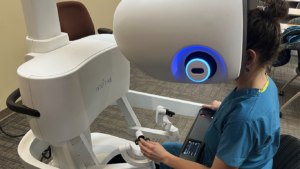“Cancer” is a scary word in any context, but colorectal cancer can be especially tricky to catch. Known as a “silent killer,” colorectal cancer symptoms often don’t present themselves until the cancer is in its late stages.
March is Colorectal Cancer Awareness Month and it’s more important than ever to be aware of the symptoms of the second-most deadly cancer for both men and women in the U.S. One in 20 Americans will be diagnosed with colorectal cancer in their lifetimes.
READ ALSO: Life in Arizona and increased risk of skin cancer go hand-in-hand
Previously considered a disease affecting those 45+, Yale research indicates that people in their 20s, 30s, and early 40s are being diagnosed at a higher rate. The populations we see come through the door at Arizona Oncology reflect that. While the reason behind the rise in younger diagnoses is not yet known, the good news is that colorectal cancer is easier to catch in its earlier stages thanks to a rise in regular screenings.
So, what can you do to mitigate the risk factors for colorectal cancer? These actions can help reduce your risk of developing or dying from the disease.
Determine your screening schedule

Colonoscopies save lives. That’s what the Colorectal Cancer Specialists at Arizona Oncology tell our patients’ families, who, with a genetic relative with the disease, are at increased risk for cancer themselves. Most people will not need to begin regular colorectal cancer screenings until they turn 45. However, those with a family history of colorectal cancer, or other digestive diseases such as Crohn’s or ulcerative colitis, are at a higher risk for developing colorectal cancer and may want to discuss beginning screenings with their doctor earlier.
Know the warning signs of colorectal cancer
It’s never easy to discuss bathroom matters, but the last place you should hold back these lifesaving details is in the doctor’s office. A change in bowel habits—ongoing constipation or diarrhea—can be an indicator of something more sinister than a sensitive stomach. Pain in the abdomen, unintentional weight loss, blood in stool, narrow stools, and passing excessive amounts of gas are also common symptoms of colorectal cancer. However, these can also be symptoms of common gastrointestinal issues such as irritable bowel syndrome (IBS) or a gluten allergy (Celiac disease). It’s important to consult with your doctor when these symptoms appear to determine the course of action, whether it’s labs, testing, or changing your dietary habits.
Change your habits
Carcinogens are agents that are known to cause cancer in humans. The most well-known source of carcinogens are cigarettes and tobacco products, so we’re going to tell you what you already know—stop smoking! However, carcinogens are more common in our culture than you may realize. The ethanol in alcoholic drinks breaks down to acetaldehyde, a known carcinogen, so stopping or reducing your drinking will cut your risk for colorectal cancer. Processed meats, such as ham, bacon, salami, and sausages, are also carcinogenic. Keeping a diet free from these meats and low in alcohol can help mitigate some of the risk factors associated with colorectal cancer.
Get your exercise
Exercise is not only a way to dramatically change how you feel about yourself, both mentally and physically, but it can also reduce your chance of colorectal cancer. Regular, moderate-to-vigorous physical activity can lower your risk and help you lose weight—another risk factor. Being overweight or obese heightens the risk of developing and dying from colorectal cancer in both men and women, so keep your weight down to keep your risk down, too.
Author: Stefanie Schluender, MD, FACS, FASCRS, is a Colorectal Surgeon at Colorectal Surgical Specialists, a community member of Arizona Oncology. Dr. Schluender earned her medical degree from Albert Einstein College of Medicine in Bronx, NY before completing her internship and residency in general surgery at Mount Sinai School of Medicine in New York. She completed her fellowship in colon and rectal surgery at Cedars-Sinai Medical Center in Los Angeles. She is board certified in general surgery and colon and rectal surgery. Dr. Schluender has been named Top Doctor in Tucson Lifestyle Magazine, as well as Castle Connolly Regional Top Doctors, and Exceptional Women in Medicine. She is a Fellow of the American College of Surgeons and the American College of Colon and Rectal Surgeons. Dr. Schluender specializes in minimally invasive/robotic assisted procedures for benign and malignant diseases of the colon, rectum, and anus. She also treats benign conditions such as Crohn’s disease, ulcerative colitis, rectal prolapse, and colon polyps. Learn more at arizonaoncology.com.



